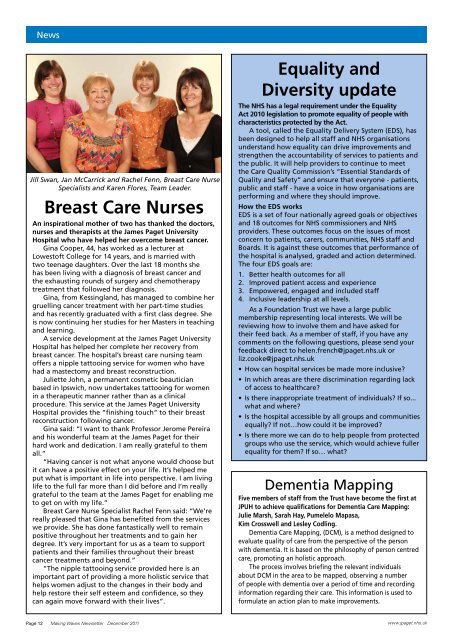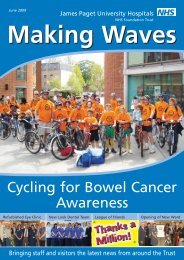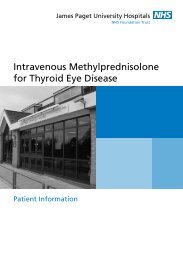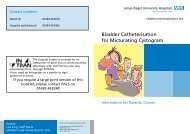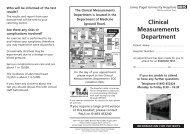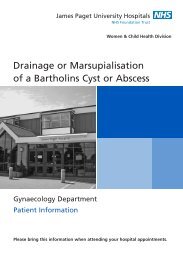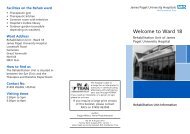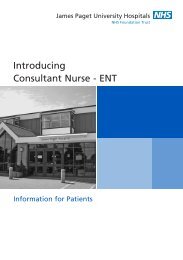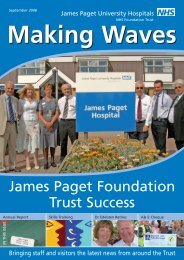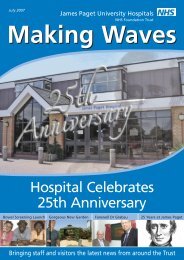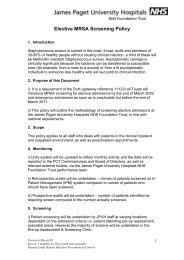Where you come first Where you come first - James Paget University ...
Where you come first Where you come first - James Paget University ...
Where you come first Where you come first - James Paget University ...
Create successful ePaper yourself
Turn your PDF publications into a flip-book with our unique Google optimized e-Paper software.
News<br />
Jill Swan, Jan McCarrick and Rachel Fenn, Breast Care Nurse<br />
Specialists and Karen Flores, Team Leader.<br />
Breast Care Nurses<br />
An inspirational mother of two has thanked the doctors,<br />
nurses and therapists at the <strong>James</strong> <strong>Paget</strong> <strong>University</strong><br />
Hospital who have helped her over<strong>come</strong> breast cancer.<br />
Gina Cooper, 44, has worked as a lecturer at<br />
Lowestoft College for 14 years, and is married with<br />
two teenage daughters. Over the last 18 months she<br />
has been living with a diagnosis of breast cancer and<br />
the exhausting rounds of surgery and chemotherapy<br />
treatment that followed her diagnosis.<br />
Gina, from Kessingland, has managed to combine her<br />
gruelling cancer treatment with her part-time studies<br />
and has recently graduated with a <strong>first</strong> class degree. She<br />
is now continuing her studies for her Masters in teaching<br />
and learning.<br />
A service development at the <strong>James</strong> <strong>Paget</strong> <strong>University</strong><br />
Hospital has helped her complete her recovery from<br />
breast cancer. The hospital’s breast care nursing team<br />
offers a nipple tattooing service for women who have<br />
had a mastectomy and breast reconstruction.<br />
Juliette John, a permanent cosmetic beautician<br />
based in Ipswich, now undertakes tattooing for women<br />
in a therapeutic manner rather than as a clinical<br />
procedure. This service at the <strong>James</strong> <strong>Paget</strong> <strong>University</strong><br />
Hospital provides the “finishing touch” to their breast<br />
reconstruction following cancer.<br />
Gina said: “I want to thank Professor Jerome Pereira<br />
and his wonderful team at the <strong>James</strong> <strong>Paget</strong> for their<br />
hard work and dedication. I am really grateful to them<br />
all.”<br />
“Having cancer is not what anyone would choose but<br />
it can have a positive effect on <strong>you</strong>r life. It’s helped me<br />
put what is important in life into perspective. I am living<br />
life to the full far more than I did before and I’m really<br />
grateful to the team at the <strong>James</strong> <strong>Paget</strong> for enabling me<br />
to get on with my life.”<br />
Breast Care Nurse Specialist Rachel Fenn said: “We’re<br />
really pleased that Gina has benefited from the services<br />
we provide. She has done fantastically well to remain<br />
positive throughout her treatments and to gain her<br />
degree. It’s very important for us as a team to support<br />
patients and their families throughout their breast<br />
cancer treatments and beyond.”<br />
“The nipple tattooing service provided here is an<br />
important part of providing a more holistic service that<br />
helps women adjust to the changes in their body and<br />
help restore their self esteem and confidence, so they<br />
can again move forward with their lives”.<br />
Equality and<br />
Diversity update<br />
The NHS has a legal requirement under the Equality<br />
Act 2010 legislation to promote equality of people with<br />
characteristics protected by the Act.<br />
A tool, called the Equality Delivery System (EDS), has<br />
been designed to help all staff and NHS organisations<br />
understand how equality can drive improvements and<br />
strengthen the accountability of services to patients and<br />
the public. It will help providers to continue to meet<br />
the Care Quality Commission’s “Essential Standards of<br />
Quality and Safety” and ensure that everyone - patients,<br />
public and staff - have a voice in how organisations are<br />
performing and where they should improve.<br />
How the EDS works<br />
EDS is a set of four nationally agreed goals or objectives<br />
and 18 out<strong>come</strong>s for NHS commissioners and NHS<br />
providers. These out<strong>come</strong>s focus on the issues of most<br />
concern to patients, carers, communities, NHS staff and<br />
Boards. It is against these out<strong>come</strong>s that performance of<br />
the hospital is analysed, graded and action determined.<br />
The four EDS goals are:<br />
1. Better health out<strong>come</strong>s for all<br />
2. Improved patient access and experience<br />
3. Empowered, engaged and included staff<br />
4. Inclusive leadership at all levels.<br />
As a Foundation Trust we have a large public<br />
membership representing local interests. We will be<br />
reviewing how to involve them and have asked for<br />
their feed back. As a member of staff, if <strong>you</strong> have any<br />
comments on the following questions, please send <strong>you</strong>r<br />
feedback direct to helen.french@jpaget.nhs.uk or<br />
liz.cooke@jpaget.nhs.uk<br />
• How can hospital services be made more inclusive?<br />
• In which areas are there discrimination regarding lack<br />
of access to healthcare?<br />
• Is there inappropriate treatment of individuals? If so...<br />
what and where?<br />
• Is the hospital accessible by all groups and communities<br />
equally? If not…how could it be improved?<br />
• Is there more we can do to help people from protected<br />
groups who use the service, which would achieve fuller<br />
equality for them? If so… what?<br />
Dementia Mapping<br />
Five members of staff from the Trust have be<strong>come</strong> the <strong>first</strong> at<br />
JPUH to achieve qualifications for Dementia Care Mapping:<br />
Julie Marsh, Sarah Hay, Pumelelo Mapasa,<br />
Kim Crosswell and Lesley Codling.<br />
Dementia Care Mapping, (DCM), is a method designed to<br />
evaluate quality of care from the perspective of the person<br />
with dementia. It is based on the philosophy of person centred<br />
care, promoting an holistic approach.<br />
The process involves briefing the relevant individuals<br />
about DCM in the area to be mapped, observing a number<br />
of people with dementia over a period of time and recording<br />
information regarding their care. This information is used to<br />
formulate an action plan to make improvements.<br />
Page 12 Making Waves Newsletter December 2011 www.jpaget.nhs.uk


